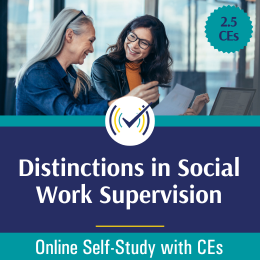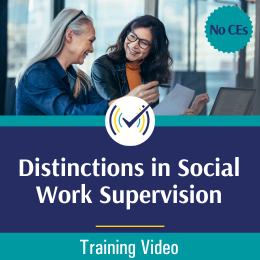Distinctions in Social Work Supervision
Enrollment in the Online Self-Study coming soon
This course offers a framework for distinguishing social work supervision from other clinical supervision forms. While supervision in professional counseling, for example, shares similarities, it differs by often focusing on specific therapeutic techniques. Social work supervision, on the other hand, embraces a broader, multifaceted ecological approach.
This course will discuss a social worker's ecological perspective and ethical considerations and will talk about how these aspects shape clinical supervision and contribute to the skillful development of social workers. This course will discuss some of the aspects of micro and macro practice in social work practice and what the superiors’s role is for these.
This course will also discuss the ethical importance addressing a client’s broader societal, systemic and environmental factors- a unique and distinctive practice within social work supervision and continuing education. Finally, this course will provide case examples with intervention strategies that will illustrate how to uphold social work core values, aligned with the NASW Code of Ethics, including service, social justice, dignity, importance of human relationships, integrity, and competence.

This course is also available without CEs for half-price.

- Distinctions in Social Work Supervision
- Description
- Learning Objectives
- Instructor
- CE Hours
- How to Complete the Course and Earn CEs
- Course Policies
- Who Should Attend
- Teaching Methods
- Course Availability
Select each tab above to view specific details about this course
This course offers a framework for distinguishing social work supervision from other clinical supervision forms. While supervision in professional counseling, for example, shares similarities, it differs by often focusing on specific therapeutic techniques. Social work supervision, on the other hand, embraces a broader, multifaceted ecological approach.
This course will discuss a social worker's ecological perspective and ethical considerations and will talk about how these aspects shape clinical supervision and contribute to the skillful development of social workers. This course will discuss some of the aspects of micro and macro practice in social work practice and what the superiors’s role is for these.
This course will also discuss the ethical importance addressing a client’s broader societal, systemic and environmental factors- a unique and distinctive practice within social work supervision and continuing education. Finally, this course will provide case examples with intervention strategies that will illustrate how to uphold social work core values, aligned with the NASW Code of Ethics, including service, social justice, dignity, importance of human relationships, integrity, and competence.
This course consists of 2.5+ hours of video instruction, a post-test and a course evaluation.
This course was recorded May 10, 2024.
Upon completion of this training, professionals will be able to do the following:
- Describe the ecological perspective to the social work supervision and why it is important to uphold this in supervision.
- Describe the distinctive features of social work supervision by comparing and differentiating it from supervision in other counseling fields.
- Describe social work supervision intervention strategies that incorporate social work ethics, societal and environmental factors.
Leslie M. Sessley, LCSW, LMFT
Leslie Sessley, a licensed clinical social worker and licensed marriage and family therapist, is the owner of a private practice focusing on intergenerational and later-life dynamics. Her practice aims to provide psychotherapy for individuals and families to flourish in their later years.
Leslie earned her master's in social work with a concentration in social administration from the University of Pittsburgh. Leslie also completed a three-year residency in Marriage and Family Therapy at the Institute of Marriage and Family Therapy at the Link Counseling Center in Sandy Springs, Georgia.
Leslie has received awards from AARP and The Governor’s Office for her work with intergenerational families and caregivers in Georgia. She has been recognized with the Best of Georgia Honorable Mention in Mental Health, Addiction, and Counseling and is a Fellow of the American Association of Marriage and Family Therapists.
She has a strong background in supervising social workers and managing mental health and community programs across private, public, and non-profit sectors. Leslie has been recognized as an expert in community education, particularly within the field of clinical social work and gerontology. She has actively contributed to the Georgia Gerontology Society, serving on its Board of Directors, Membership, and Scholarship Review Committees.
Credit Hours: This course offers 2.5 continuing education hours of credit
Marriage & Family Therapists: Telehealth Certification Institute, LLC is recognized by the New York State Education Department's State Board for Mental Health Practitioners as an approved provider of continuing education for licensed marriage and family therapists #MFT-0135, effective May 8, 2025.
Social Workers: Telehealth Certification Institute LLC, #1609, is approved as an ACE provider to offer social work continuing education by the Association of Social Work Boards (ASWB) Approved Continuing Education (ACE) program. Regulatory boards are the final authority on courses accepted for continuing education credit. ACE provider approval period: 05/02/2024 – 05/02/2027. Social workers completing this course receive 2.5 clinical continuing education credits.
Telehealth Certification Institute, LLC is recognized by the New York State Education Department's State Board for Social Work as an approved provider of continuing education for licensed social workers #SW-0435.
Other Professionals: This course qualifies for 150 minutes of instructional content as required by many national, state and local licensing boards and professional organizations. Retain your certificate of completion and contact your board or organization for specific filing requirements.
This is a non-interactive, self-study course.
To receive your certificate of completion you must complete the course in its entirety.
Online courses are completed by registering, logging in, navigating to your course using the menu (My Courses – the Course Title), completing all of the modules, completing and passing the post-test, and completing the course evaluation. Participants have 6 months from registration to access and complete online self-study courses.
Live Webinar courses are completed by registering, logging in to this website, navigating to your course using the menu (My Courses – the Course Title), attending the full course via webinar, submitting your attendance, and completing the post-test and course evaluation online.
Psychologists and other professionals seeking CE credit through our approval with the American Psychological Association are asked, but not required, to complete the course evaluation before obtaining their certificate of completion, however passing a post-test for online self-study courses and live webinars, and submitting one's attendance for live on-site and live webinars is required.
You can receive your certificate of completion by logging onto this website, navigating to the course using the menu (My Courses – the Course Title), scroll to the bottom of your course, and click on your certificate to either download it or print it.
Directions for completing a course can be found by clicking here.
Accommodations for Individuals with Disabilities
Click here to view our Accommodations for Individuals with Disabilities.
Cancellation Policy
Refunds are offered within the first 30 days for courses which have not been completed. There is a 10% service fee for refunds.
Grievance Policy
This course is intended for clinicians who provide behavioral health services.
Teaching methods for this course include recorded lectures, videos, a post-test, and a course evaluation.
This program was recorded on May 10, 2024
You have six months to access online courses from the time of purchase.

Leslie M. Sessley
LCSW, LMFT
Leslie Sessley, a licensed clinical social worker and licensed marriage and family therapist, is the owner of a private practice focusing on intergenerational and later-life dynamics. Her practice aims to provide psychotherapy for individuals and families to flourish in their later years.
Leslie earned her master's in social work with a concentration in social administration from the University of Pittsburgh. Leslie also completed a three-year residency in Marriage and Family Therapy at the Institute of Marriage and Family Therapy at the Link Counseling Center in Sandy Springs, Georgia.
Leslie has received awards from AARP and The Governor’s Office for her work with intergenerational families and caregivers in Georgia. She has been recognized with the Best of Georgia Honorable Mention in Mental Health, Addiction, and Counseling and is a Fellow of the American Association of Marriage and Family Therapists.
She has a strong background in supervising social workers and managing mental health and community programs across private, public, and non-profit sectors. Leslie has been recognized as an expert in community education, particularly within the field of clinical social work and gerontology. She has actively contributed to the Georgia Gerontology Society, serving on its Board of Directors, Membership, and Scholarship Review Committees.
Testimonials
Bridgette Nalumu
Public health consultant, Green and Purple Consultancy Network
Lora Verley
Clinical Therapist, Bayless Integrated Healthcare
Jackie Tanna
Therapist, Region One Mental Health
Jackie Bell-Russell
Therapeutic Behavioral Strategist, Rialto Unified School District